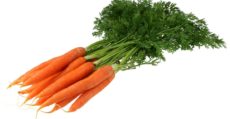
CARROTS contain beta-carotene, a type of vitamin A that prevents night blindness and promotes a healthy retina. The body uses beta-carotene to make vitamin A. Vitamin A helps the eye convert light into a signal that can be transmitted to the brain, allowing people to see under conditions of low light. Every year an estimated 250,000 to 500,000 children become blind as a result of vitamin A deficiency. When it comes to eating nutrient-rich foods to improve eyesight, more generally, Dr. Khanjian suggests stocking up on green, leafy vegetables. Spinach, kale or collard greens—all chock-full of lutein and zeaxanthin (which are other food-derived nutrients)—could help protect your eyes by filtering high-energy wavelengths of visible light that can damage the retina. Such foods may also help to protect against age-related macular degeneration, the major cause of blindness in the elderly.
I think you have observed some very interesting points, thankyou for the post.